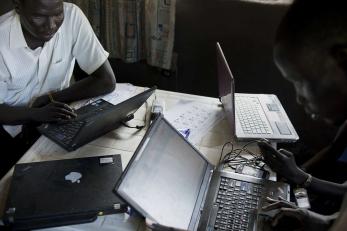Analyzing and Responding to Social Media and Conflict

Social media is transforming conflict. From disinformation campaigns to electoral manipulation and online recruitment by violent extremist organizations, digital threats exacerbate conflict drivers, open new avenues for spoilers, and increase polarization, complicating efforts to prevent or counter violent conflict.
Peacebuilding initiatives therefore need to incorporate a digital lens. Addressing this challenge requires a sound risk assessment framework to empower local actors, international partners, and social media companies to anticipate and prevent harms arising from the interplay between digital ecosystems and off-line conflict dynamics. Building on case studies examining the threats and opportunities surrounding social media in Ethiopia, Iraq, Myanmar, and Nigeria, Mercy Corps has developed a framework to inform approaches and methods for addressing the weaponization of social media, as well as advance online and off-line social cohesion and peace. The framework is accompanied by a policy brief as well as a report of key research findings.
We welcome you to read our reports, engage with us, and share them via your networks.
Download An Applied Framework for Analysis setting out a framework for understanding the risks and resilience of social media and conflict, in particular six factors for analysis in a country or sub-national context.
Download the Research Summary and Policy Brief containing a summary of the research and recommendations to social media platforms, donors, governments, and civil society.
Download the Research Findings exploring the role of social media in the conflict dynamics of four distinct country contexts: Ethiopia, Iraq, Myanmar, and Nigeria.